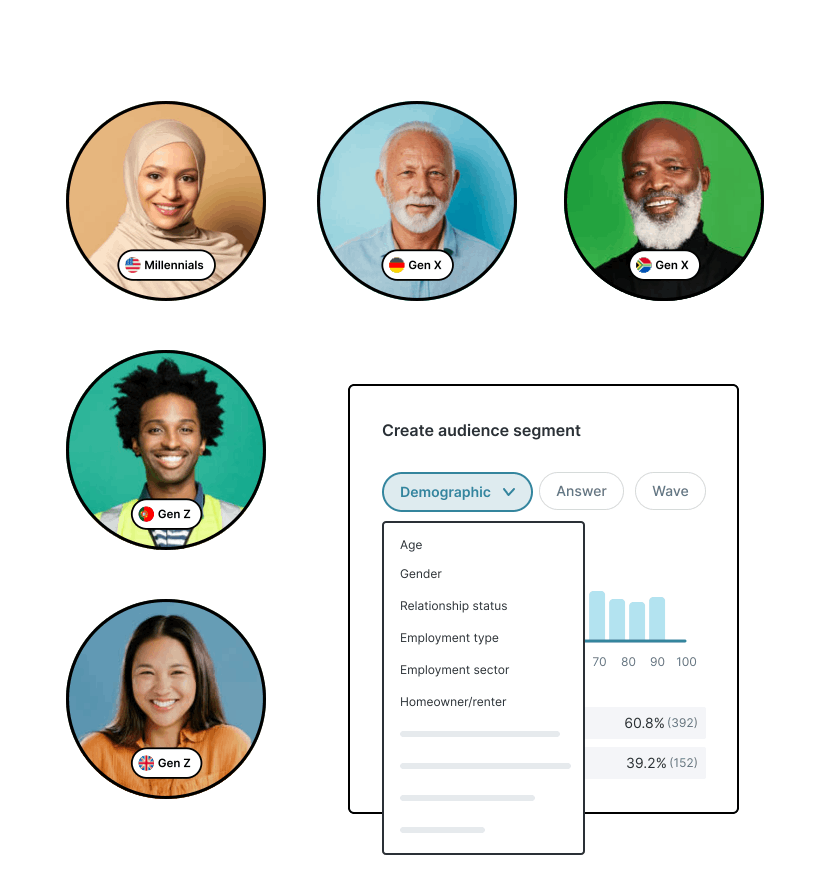How to market a new product: 11 must-follow methods for 2025

You’ve done all the work to create and launch the perfect product—now it’s time to create the perfect marketing strategy. Here’s how you can make your product launch a success that sets you up for long-term growth.
Here’s a TL;DR of the 11 methods to whet your appetite…
- Base your decisions on market research
- Create a product in collaboration with your existing customers
- Give early access to loyal customers
- Let influencers promote products
- Determine the best place to sell your new product
- Go wild with guerrilla marketing
- Focus your marketing efforts on referrals
- Start a wait list
- Buy one, give one for free
- Double down on personal sales
- Partner up with bigger names
How to market a new product: 11 Methods
You want to get your target audience as excited about your new product as you are. How do you turn them into customers (and ideally fans) in the first months after launching your new service or product?
Take a look at these tips and real-life examples to fuel your product marketing strategy.
1. Base your decisions on market research
We can’t stress enough how much market research should be a part of your product marketing. This is because a super creative campaign doesn’t automatically resonate with your target market. So, let’s get to know them.
You probably used some form of consumer research to help you develop and create your product effectively. But your research projects definitely shouldn’t end there—you should use research to market a product, as well as to create it in the first place.
Using data to support your marketing campaign always pays off. That’s also what DRY Soda Co. saw when they wanted to launch a new product during the pandemic. Thanks to market research upfront, they created a product and strategy that landed them an increase of 136% new-to-brand customers.
Their combination of small focus groups and a larger surveys through Attest helped them validate their findings. Eventually, they confidently launched three new flavors. They became the bestselling item on DRY’s site, and ended up in the top 15 of new products on Amazon.
If you want to get it right, make market research a no-skip step in your product marketing process. With Attest, you get access to your very own dedicated research expert to make sure your survey asks all the right questions. Make the most of your market research!

Find out how to market latest product
With Attest you get fast, reliable insights about your new products, to make sure you know how to launch it successfully
Get your insights!2. Create a product in collaboration with your existing customers
Including your target audience in the decision-making about your new product is always a good idea, and it certainly helps in your marketing efforts.
But your existing customers are also an important source of inspiration. They know better than anyone what it’s really like to use your products, so could give you a particularly useful nuanced opinion of your latest offering. Plus, you need to know whether you’ll retain customers or generate repeat customers with your new products, as well as whether you’ll gain new customers.
The company that probably has gone the furthest in this approach is IKEA. In 2018, they launched Co-Create IKEA. On this digital platform, anyone could help develop new products or give suggestions for existing products, one of which is shown below.
Not only is this a great way to innovate products directly based on what consumers want, but it can also play a great role in the new product marketing for those co-created products.
3. Give early access to loyal customers
You don’t have to find new customers for your new product. You can sell it to existing or previous customers as well. They already love your products, so love them back.
Give loyal customers first access or even a discount pre-launch. This can help you build a hype around the product and get those first sales in. It should also help you retain customers by making them feel special and a part of your strategy.
A lot of AI tools are deploying this tactic right now. Take Jasper.ai. for example. Before they launched their AI image generator, they gave all their existing customers the opportunity to put themselves on the waitlist and get the tool first, at a discounted price. Works like a charm, as long as the reward is big enough. Show your customers that you appreciate them and want them to enjoy your new product!
And remember to make use of your existing loyalty programs. You could invest thousands in ad campaigns to attract new customers, or you could use your loyalty programs to reach the people who already fit your picture of the ideal buyer.
You can easily use email marketing to offer free shipping, exclusive packages or discounts. You can even give a free gift to the first 100 customers, or whatever number makes sense in your market.
4. Let influencers promote products
Sometimes influencers are the way to market your new product. Heck, sometimes they are even the ones coming up with the products.
Influencers are great at building hype around a product. From podcasters talking about books that are only out for pre-order still, to beauty influencers trying out new lipsticks that will only be released the next season: every industry can benefit from influencer marketing.
A prime example is Germany’s most successful fitness influencer Pamela Reif and everdrop, a sustainable shop for all things personal care and cleaning. Together they developed a detergent especially for your sweaty sportswear, and with 9 million dedicated followers the first few batches sold out instantly. It’s a great example of playing into what your target group wants, and using the perfect channels to market to them.
5. Determine the best place to sell your new product
Your product can be the best thing since sliced bread, but if you’re not putting it out there in the right places, it won’t sell. Don’t necessarily stick to the channels and stores you know, but make the ‘where’ part of your product.
Survey consumers to find out what their preferred shopping channel would be for this particular product. That data will also give you an entry point in those places, which is what Big Prawn Co learned.
Big Prawn Co embarked on a fish-free fingers and burgers NPD project, using consumer research to shape the new offering at every step of the way. Using an audience of vegetarians, vegans, pescatarians and flexitarians they identified strong demand for their ‘Free From The Sea’ plant-based fish fingers and burgers. And that data helped them secure a spot at Waitrose.
We literally put the survey data into the initial sales pitch as a key element as to why this is suitable to launch in your store. And because I asked where people shop, I was able to filter it and dedicate a survey specifically to Waitrose.
Claire Evans, Category Manager, Big Prawn Co.
When you embark on a mission to market a product, make sure you choose the right locations. Whether it’s online marketing channels, social media platforms or even a brick and mortar store, make sure your decision is based on data.
6. Go wild with guerrilla marketing
In 2021, dating app Thursday launched, with 100,000 people signed up before the app even became available to download. Those numbers grew rapidly in the following months, and they’ve got an interesting strategy to thank for that.
First of all, Thursday did a great job on PR in the weeks leading up to their launch, being covered in press releases on platforms ranging from LADbible to the BBC.
But they developed a marketing strategy for their new product that was daring and creative. They’re ace at guerilla marketing, with product marketing campaigns that range from sassy billboards in train stations to hosting events in bars. It shows they have a deep understanding of what their ideal customer likes and they are standing out from all other dating apps in terms of content marketing.
They even use their interns as influencers, sending them out on the street with balloons. And in the right location, that will get you a lot more new users than other marketing efforts like search engine optimization can achieve in a single day.
Then Thursday thought: why stop at letting our human interns out on the streets? And they sent out a camel.
Outside Liverpool Street Station in London they promoted the app with a camel wearing a handwritten billboard, jumping on the hump day trend. Which is on Wednesday. Smart, Thursday.
7. Focus your marketing efforts on referrals
One product marketing strategy that has proven to be successful time and time again, is referral marketing. The examples are endless, and the concept is simple. Ask those signing up or buying your product to refer you to someone else. Give both participants a reward and watch your sales spike.
A famous example is Dropbox, who grew from 100k registered users in 2008 to 33.9 million in 2017, with most of the new users coming through referrals.
Its success is self-explanatory: chances are someone who signs up or buys from you is friends with other potential customers who fit your product persona. People with similar interests tend to hang out. And everyone loves discounts or rewards.
You can use referral marketing even in the early stages, and without giving monetary rewards. Fintech platform Robinhood used referrals for their product marketing and gave earlier access for each referral that was given. Smart, and it builds excitement.
8. Start a wait list
Much like shortening the queue, waiting lists also work. Yeah, people are weird.
We all want to be the first one to try something shiny and new. That’s why wait lists have been and probably always will be smart methods for selling new products.
A recent example of a company that is building a waiting list is OpenAI. While ChatGPT is still free for all, they’ve already started with a waiting list for an experimental paid version of the AI tool. The promise is that this ChatGPT Pro version will always be available, will be quicker and give more answers.
Waiting lists are a smart way to generate leads while setting yourself up for a successful product launch, and allow you to build more of a buzz through email marketing. It’s ticking a lot of boxes!
9. Buy one, give one for free
A great way to boost sales for any product, but especially for new products, is by deploying the ‘buy one, give one’ model. You might have seen this from Masterclass: they offer new subscribers the chance to give away a subscription for free to someone they know. It’s a great way to spread visibility in your target market.
Sure, that doesn’t boost your revenue directly, but you get a lot more people to try out your product. You’re in it for the long run with this tactic, because those users could turn into repeat buyers once their subscription ends or the product needs a refill. Think ahead!
10. Double down on personal sales
If you’re launching a particularly difficult new product, don’t just focus on the campaigns: focus on the people.
You can make customer education a big part of your sales strategy, and for some products, that really pays off. Research found that selling new products requires significantly greater intensity and consumes much more attention.
When it comes to new products, salespeople spend 35% more time meeting with customers throughout the sales cycle than they do when selling established goods and services. Create content that educates your prospective customers. From a blog post to FAQs, to how-to guides about your new product features. And: train your team to give the best advice possible. You can even host webinars or free Q&A sessions to talk about the new product and resolve any doubts!
11. Partner up with bigger names
One of the smartest ways to make sure your product launch is a success is by partnering up with an established name that your target market happens to love.
Ocado used Attest to conduct consumer research to shape their new Disney meal bundle offering and maximize an important partnership opportunity.
Partnerships like this are a great example of effective product marketing based on research. It gives your new product an extra layer of fun and you benefit from each other’s audience!
Best practices to create loyal customers
When launching a new product you don’t want people to buy it just once. Here’s how you keep them coming back over time.
Recurring market research
What customers are looking for is constantly changing. Stay up to speed by running regular surveys to your various customer segments. Having fresh data available will take out the guesswork of your product marketing strategy and new product development, which will give you speed and better results.
Delight, delight, delight
Is it really a great product if customer service isn’t up to par? Treat your customers with the utmost care and make sure your customer service team is delivering a great experience.
Treat them like you’d treat your best friend
Go the extra mile and give loyal buyers or users perks. It helps build a relationship and you will stay top of mind. We love this example of how DRY Soda Co. does it.
Personalize the experience
Personalization isn’t just cute, it’s useful too and can be a part of a great user interface. Make sure their account or profile has everything they need and throw in some personalization there to give it a purpose.
Always follow up
Follow up with them after a purchase, ask for feedback, and address any issues promptly. This will make sure they are using their products the right way, which is simply part of the product!
Create a community
Nobody loves seeing ads. But if you can build a community in which useful tips can be shared, where people can connect and where they can come for advice, you also create a place in which you can more organically talk about new products or new features. Plus, it’s a great source of information on your customers.
What’s the best new product marketing strategy?
Crafting the perfect market strategy for a new product is difficult, no matter what industry you’re in. It requires extensive market research and effective decision-making based on the data that’s obtained, plus a whole lot of creativity. Take some time to investigate your target market’s interests and needs before deciding on a strategy!
Successfully launch your next big product
Make sure you know how and where to place your latest products, with insights from Attest. You get a fast, intuitive consumer research platform plus expert advice from research pros!
Get your copy now!FAQs
Knowing your customers is the key to attracting them. How do you get to know who they are and what they’re looking for? The answer is market research. Reach out through surveys and polls, attend customer focus groups, follow social media trends. Taking the time to understand who your customers are, what they care about, and how they communicate can make all the difference when it comes to marketing your product or service. After all, if you don’t know what they’re looking for and speaking their language, you won’t be able to effectively engage them in order to meet their needs!
When it comes to promoting a new product, market research is key to ensure you’re tapping into the right market, the right way. From there, you can use a variety of methods like creating waiting lists, referral marketing, or even guerilla tactics. Waiting lists are a great way to build up anticipation for your product and get people excited about it before its release. Referral marketing works well at incentivizing existing customers to tell their social networks about the new product. Want to get creative? Guerilla marketing tactics can help you generate buzz for the product launch. Pick the one that resonates with your audience most!
Market research is an invaluable tool for any marketer promoting a new product. Without market research, you are stuck in the dark—you have no idea who the target market is, what their preferences and biases are, or if the market even has room for your amazing new product. Market research helps you uncover these insights, so instead of blindly throwing money at a marketing campaign, you can tailor your efforts more precisely to ensure maximum success and actual return on investment. Market research allows you to make more informed decisions when promoting a new product, minimizing risk and maximizing potential reward.
Tell us what you think of this article by leaving a comment on LinkedIn.
Or share it on:
